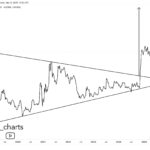
Crypto Update: Penny Stocks Are Paying Attention
Classover Holdings (KIDZ) announced in early May its intention to issue $400 million in shares for the purpose of acquiring Solana. This news resulted in a significant rise in its stock price. Following the announcement, shares of the lightly traded enterprise, valued at under $50 million, surged from $1.15 to over $7 within just two trading days, before stabilizing at approximately $3.69.
The surge prompted by Classover is part of a broader trend among various smaller companies dabbling in cryptocurrency. These firms are not incorporating digital currencies as a main business focus or transaction medium; instead, they are using it as a strategic asset to attract attention. Typically, they announce a new strategy involving the acquisition of cryptocurrencies like Bitcoin or Solana, leading to a spike in their stock prices.
On the same day, GD Culture Group (GDC) revealed its plan to raise up to $300 million in shares to purchase Bitcoin and TrumpCoin (TRUMP), a meme token inspired by former President Donald Trump. This initiative was presented as part of the company’s new “crypto asset treasury strategy,” resulting in a 13% increase in stock value following the announcement.
Amber International Holdings (AMBR), which has a valuation close to $900 million, also declared an investment of $100 million into a variety of cryptocurrencies, including Bitcoin, Ethereum, and others. These strategic moves contribute to a narrative similar to that of MicroStrategy (MSTR), which became known for adopting Bitcoin as its primary treasury reserve in August 2020, resulting in a remarkable over 3,000% increase in its stock price, primarily linked to Bitcoin’s rise.
While MicroStrategy has established a sustainable business model and a coherent approach—championed by its chairman Michael Saylor as an early Bitcoin advocate—new entrants seem to be capitalizing on cryptocurrency’s buzz with little to show in terms of a robust business framework.
Another example is Worksport, a Nasdaq traded manufacturer of truck bed covers, which last year announced its intention to invest its cash reserves in Bitcoin and XRP. Though its stock initially rose after the announcement, the increase proved short-lived as shares returned to earlier levels. Company representatives mentioned in April that they had made a modest initial purchase.
The formula appears to be clear: identify a popular cryptocurrency, announce a strategic investment, and ride the wave of increased interest from retail investors. Often, the proposed investments dwarf the companies’ actual market capitalizations, as seen with Classover and GD Culture.
It remains uncertain if these companies will execute their stated cryptocurrency purchases or how they will finance them. However, the trends suggest that smaller firms are using crypto as a means to amplify their visibility in the market.
This tactic continues to show short-term efficacy. With the market responding favorably to crypto-related announcements, it’s likely that more small businesses will continue to pursue similar strategies.
The long-term loyalty of these companies to cryptocurrency, resembling that of MicroStrategy, is still an open question.
Some organizations appear to be committing more seriously to the strategy. For instance, Japanese investment entity Metaplanet has steadily accrued Bitcoin holdings since it established its Bitcoin Treasury Operations in April 2024, gaining recognition as a serious corporate holder in the Asian market.
Likewise, Semler Scientific, a U.S.-based medical device manufacturer, has consistently purchased Bitcoin since designating it as a reserve asset, holding a total of 3,634 BTC and following a model akin to that of MicroStrategy.


















Post Comment